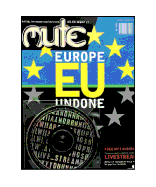Media and the Unmediatable
Editorial
The last few months have seen some major political and cultural battles played out in the zone of the media. The Serbian government is constantly hounding the independent radio stations B2-92 and Indeks. In May, balaclava-wearing police commandos swept through the Moscow offices of Media-Most after they criticised Putin’s policy in Chechnya. Austria’s neo-fascist Freedom Party, meanwhile, prevented by Western Europe’s more liberal conventions from sending in the SWAT team, have resorted to the courts to silence reportage they don’t like — as Eva Grubinger reports in this issue of Mute. Our networked legal systems often give such conflicts an international dimension: a magazine or news programme in London can (almost) as easily be prosecuted as their Vienna counterparts. Indeed, a recent ruling by the English House of Lords allowing the Russian tycoon Boris Berezovsky to sue the American magazine Forbes illustrates the extent to which debates over who can say what, about whom, where, have — like so many other things — become globalised.
It’s tempting to think through the whole issue under the umbrella of representation: who controls it thereby gets to ‘write’ the ‘truth’. Two recent events, however — both libel trials — urge caution. In the first, the maverick historian David Irving sued Penguin books for calling him a holocaust revisionist. Irving was a revisionist: he lost. In the second, ITN sued Living Marxism for claiming that the former had faked footage of Muslims interned in a Serb concentration camp during the Bosnian War. ITN hadn’t faked the footage: they won. In both cases the lying party cast themselves — and not inaccurately — as independent voices battling giant media conglomerates. Irving was backed by wealthy anti-semites, LM by a few among the intellectual left who, at best, should have known better.
What does all this prove? That David isn’t always the good guy and Goliath bad? Certainly. That, ironically, plurality of media doesn’t necessarily provide for free and accurate media environments? Possibly. But also, and especially when events as monumental and ineffable as the holocaust are involved, that there’s an area beyond representation and its attendant — and important — politics. To cast this area as the zone of truth would be simplistic. Perhaps it’s better to say that the possibility for any (plural, dialogic) construction of truth, knowledge and history stems from this area, but that ultimately it remains resistant to mediation, looming always outside, like some immense block of matter.
Tom McCarthy <tom AT envoi.demon.co.uk>
Mute Books Orders
For Mute Books distribution contact Anagram Books
contact@anagrambooks.com
For online purchases visit anagrambooks.com







